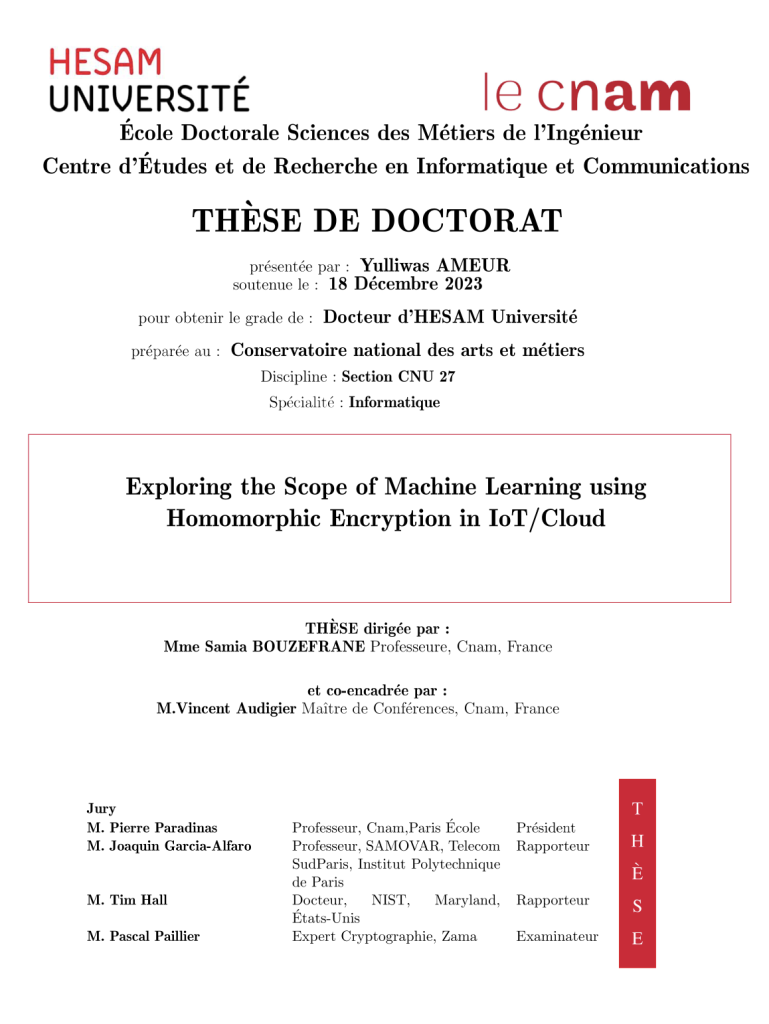Yulliwas Ameur, Ph.D. student in the ROC Team, will defend his Ph.D. thesis on December 18, 2023, at 2:00 p.m., in the Amphitheatre Fabry Pérot, CNAM, 292 rue Saint-Martin, 75003 Paris, France.
To better organize this event, participants wishing to attend the Yulliwas’s Ph.D. defense are pleased to confirm their attendance by registering on the following Eventbrite link:
Thesis Title: Exploring the Scope of Machine Learning using Homomorphic Encryption in IoT/Cloud
Thesis Title (French): Exploration de l’apprentissage automatique avec le chiffrement homomorphe dans l’internet des objets/Cloud
The main objective of his research is to explore the application of homomorphic encryption in machine learning for IoT/Cloud, a crucial area for the development of future technologies. The goal is to propose innovative solutions that enhance data security in IoT/Cloud environments using machine learning.

Abstract:
Machine Learning as a Service (MLaaS) has accelerated the adoption of machine learning techniques in various domains. However, this trend has also raised serious concerns over the security and privacy of the sensitive data used in machine learning models. To address this challenge, our approach is to use homomorphic encryption.The aim of this thesis is to examine the implementation of homomorphic encryption in different applications of machine learning.. The first part of the work focuses on the use of homomorphic encryption in a multi-cloud environment, where the encryption is applied to simple operations such as addition and multiplication.This thesis explores the application of homomorphic encryption to the k-nearest neighbors (k-NN) algorithm. The study presents a practical implementation of the k-NN algorithm using homomorphic encryption and demonstrates the feasibility of this approach on a variety of datasets. The results show that the performance of the k-NN algorithm using homomorphic encryption is comparable to that of the unencrypted algorithm.Third, the work investigates the application of homomorphic encryption to the k-means clustering algorithm. Similar to the k-NN study, the thesis presents a practical implementation of the k-means algorithm using homomorphic encryption and evaluates its performance on various datasets.Finally, the thesis explores the combination of homomorphic encryption with differential privacy (DP) techniques to further enhance the privacy of machine learning models. The study proposes a novel approach that combines homomorphic encryption with DP to achieve better privacy guarantees for machine learning models. The research presented in this thesis contributes to the growing body of research on the intersection of homomorphic encryption and machine learning, providing practical implementations and evaluations of homomorphic encryption in various machine learning contexts.iffalseAccording to Gartner, 5.8 Billion Enterprise and Automotive IoT endpoints will be in use at the end of 2020 while Statistica shows that IoT enablers solutions (such as Cloud, analytics, security) will reach 15 Billion of euros in the European Union market by 2025. However, these IoT devices have not enough resource capacity to process the data collected by their sensors making these devices vulnerable and prone to attack. To avoid processing data within the IoT devices, the trend is to outsource the sensed data to the Cloud that has both resourceful data storage and data processing. Nevertheless, the externalized data may be sensitive, and the users may lose privacy on the data content while allowing the cloud providers to access and possibly use these data to their own business. To avoid this situation and preserve data privacy in the Cloud datacenter, one possible solution is to use the fully homomorphic encryption (FHE) that assures both confidentiality and efficiency of the processing. In many smart environments such as smart cities, smart health, smart farming, industry 4.0, etc. where massive data are generated, there is a need to apply machine learning (ML) techniques, hence contributing to the decision making to act on the smart environment. Indeed, the challenging issue in this context is to adapt the ML approaches to apply them on encrypted data so that the decision taken on encrypted data can be reported on the cleartext data. This PhD thesis is a cooperative research work between two teams ROC and MSDMA of CEDRIC Lab. It aims at exploring the use of ML and FHE in smart applications where IoT devices collect sensitive data to outsource them on untrusted Cloud datacenter for computing thanks to ML models.
Yulliwas’s publications:
Journal articles
- Yulliwas Ameur, Samia Bouzefrane, Soumya Banerjee. Developing Adaptive Homomorphic Encryption through Exploration of Differential Privacy. Journal of Cyber Security and Mobility, 2024, pp.863-886. ⟨10.13052/jcsm2245-1439.1353⟩. ⟨hal-05330716⟩
Conference papers
- Yulliwas Ameur, Samia Bouzefrane. Enhancing privacy in VANETs through homomorphic encryption in machine learning applications. 15th International Conference on Ambient Systems, Networks and Technologies Networks (ANT 2024), Apr 2024, Hasselt, Belgium. pp.151-158, ⟨10.1016/j.procs.2024.06.010⟩. ⟨hal-04676567⟩
- Yulliwas Ameur, Samia Bouzefrane, Thinh Le Vinh. Handling security issues by using homomorphic encryption in multi-cloud environment. The 14th International Conference on Ambient Systems, Networks and Technologies (ANT), Mar 2023, Leuven, Belgium. ⟨hal-03933238⟩
- Yulliwas Ameur, Rezak Aziz, Vincent Audigier, Samia Bouzefrane. Secure and non-interactive k-NN classifier using symmetric fully homomorphic encryption. Privacy in statistical databases (PSD'2022), Sep 2022, Paris, France. pp.142-154, ⟨10.1007/978-3-031-13945-1_11⟩. ⟨hal-03933277⟩
Book sections
- Yulliwas Ameur, Samia Bouzefrane, Vincent Audigier. Application of Homomorphic Encryption in Machine Learning. Kevin Daimi, Abeer Alsadoon, Cathryn Peoples, Nour El Madhoun Editors. Emerging Trends in Cybersecurity Applications, Springer International Publishing, pp.391-410, 2023, 978-3-031-09639-6. ⟨10.1007/978-3-031-09640-2_18⟩. ⟨hal-03933309⟩
Theses
- Yulliwas Ameur. Exploring the Scope of Machine Learning using Homomorphic Encryption in IoT/Cloud. Cryptography and Security [cs.CR]. HESAM Université, 2023. English. ⟨NNT : 2023HESAC036⟩. ⟨tel-04587371⟩
Access Thesis: https://theses.fr/2023HESAC036



